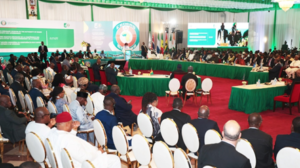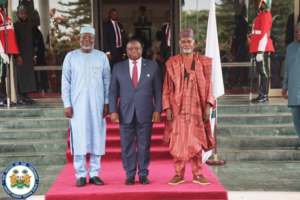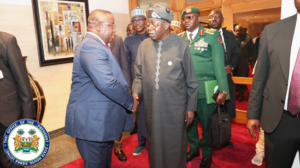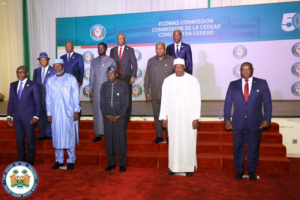Abuja, Nigeria, Saturday June 21, 2025
Sierra Leone’s President, Dr. Julius Maada Bio, has officially assumed the Chairmanship of the Authority of Heads of State and Government of the Economic Community of West African States (ECOWAS), marking a historic moment as the first Sierra Leonean Head of State to hold this prestigious position.


The announcement has been met with great national pride, as President Bio takes on a role that symbolizes renewed commitment to unity, peace, security, and sustainable development across the West African region. Known for his democratic credentials and consistent pursuit of social and economic progress, President Bio is widely seen as a transformative leader ready to steer ECOWAS through challenging times.
In his new role, President Bio has outlined four key strategic priorities: restoring constitutional order and deepening democracy; revitalizing regional security cooperation; unlocking economic integration; and building institutional credibility. These pillars are expected to guide ECOWAS’ efforts toward regional stability, economic prosperity, and enhanced cooperation among member states.


President Bio extended his appreciation to his predecessor, President Bola Ahmed Tinubu of Nigeria, for his steadfast leadership and commitment to regional dialogue and peace-building during his tenure.
“Thank you for placing your trust in me and in the Republic of Sierra Leone,” President Bio said in his acceptance remarks. “I accept this responsibility with full awareness of the magnitude of the task ahead and the complexity of the moment.”
President Bio’s appointment comes at a critical juncture for West Africa, and his leadership is seen as a beacon of hope and solidarity for a region striving toward greater integration and resilience.
For more information:
State House Media and Communications
info@statehouse.gov.sl
Abuja, Nigeria, June 22, 2025. PRESS RELEASE 67TH ECOWAS SUMMIT: H.E. JULIUS MAADA BIO, PRESIDENT OF SIERRA LEONE, IS THE NEW CHAIRMAN OF THE CONFERENCE OF HEADS OF STATE AND GOVERNMENT FOR A ONE-YEAR TERM. The Authority of Heads of State and Government of the Economic Community of West African States (ECOWAS) held its Sixty-Seventh Ordinary Session, today, 22 June 2025, in Abuja, Nigeria. During the Session, the Heads of State considered the report of the 94th Ordinary Session of the Council of Ministers, and reports on the State of the Community, the Security and Political Situations in the Region, among others.
H.E. Dr. Omar Alieu Touray, President of the ECOWAS Commission, warmly welcomed ECOWAS leaders while paying tribute to Nigeria’s leadership and hospitality under H.E. President Bola Ahmed Tinubu’s Chairmanship of the Authority. Dr. Touray highlighted ECOWAS’s achievements over the past 50 years, reaffirming its standing as Africa’s most advanced Regional Economic Community, despite ongoing challenges. He stressed that dialogue with the three member states that have withdrawn is progressing positively, and called for stronger support for the region’s private sector to drive sustainable growth, job creation, and deeper integration. He paid tribute to ECOWAS’s Founding Fathers for laying the foundation for unity and regional cooperation.
In his opening statement, H.E. Bola Ahmed Tinubu, President of the Federal Republic of Nigeria and Chair of the Authority of ECOWAS Heads of State and Government, reflected on ECOWAS’s remarkable achievements for the past 50 years, while urging leaders to confront persistent security threats. He emphasized that no single country could tackle terrorism, violent extremism, and cross-border crimes alone, and called for stronger coordination, political will, and decisive collective action to safeguard peace and stability across West Africa. “While celebrating our achievements over the past 50 years, we must also confront the challenges that continue to impede our aspirations; like the security threats, violent extremism and other cross-border crimes that continue to widen and deepen in their intensity. No single Nation can address these challenges alone. We must rethink coordination, amplify political will, and prioritise a collective approach to security. We must act decisively in the fight against terrorism to serve as instrument for peace and stability for our region”, he stressed.
H.E. Leonardo Santos Simão, Special Representative of the UN Secretary-General for West Africa and the Sahel (UNOWAS), in his statement, conveyed the UN Secretary-General’s warm greetings, and reiterated the United Nations’ commitment to supporting peace, security, and regional integration in West Africa. He highlighted the UN’s active diplomatic engagement across the region and underscored the urgent need for collective action against terrorism, which remains the most significant threat to stability.
In his message, H.E. Mahmoud Ali Youssouf, Chairperson of the African Union Commission, delivered by H.E. Ambassador Bankole Adeoye, Commissioner for Political Affairs, Peace and Security of the African Union Commission, conveyed heartfelt congratulations to ECOWAS leaders and citizens on the 50th anniversary of ECOWAS. He celebrated ECOWAS’s legacy as a symbol of unity, resilience, and regional integration since its founding in 1975. Looking ahead, the AU Chairperson urged a united and coordinated response to pressing challenges, including terrorism, violent extremism, and unconstitutional changes of government, while deepening efforts to tackle poverty and inequality. He reaffirmed the AU’s unwavering support for ECOWAS, and called for a people-centred Community, where youths and women lead regional transformation through innovation, technology, and quality education.
The Authority of ECOWAS Heads of State and Government at the end of the Summit elected H.E. Julius Maada Bio, President of the Republic of Sierra Leone, as the Chairman of the Authority to replace H.E. Bola Ahmed Tinubu, President of the Federal Republic of Nigeria, whose tenure came to an end. A communique will be issued at the end of the Summit.
—————END—————–
For further information, Kindly contact: Directorate of Communication, ECOWAS Commission Twitter: @ecowas_cedeao – Facebook: Ecowas-Cedeao www.ecowas.int Abuja, Nigeria, June 22, 2025. Page 3 / 3 Directorate of Communication 101 Yakubu Gowon Crescent • Asokoro District • P.M.B. 401 – Abuja • Nigeria www.ecowas.int
PRESS RELEASE About ECOWAS The Heads of State and Government of fifteen West African Countries established the Economic Community of West African States (ECOWAS) when they signed the ECOWAS Treaty on the 28th of May 1975 in Lagos, Nigeria. The Treaty of Lagos was signed by the 15 Heads of State and government of Benin, Burkina Faso, Côte d’Ivoire, The Gambia, Ghana, Guinea, Guinea Bissau, Liberia, Mali, Mauritania, Niger, Nigeria, Sierra Leone, Sénégal and Togo, with its stated mission to promote economic integration across the region. The Senegalese President was represented by the Minister for Foreign Affairs. Cabo Verde joined the union in 1977. The only Arabic-speaking Member, Mauritania, withdrew in December 2000. Mauritania recently signed a new associate-membership agreement in August 2017.
On January 29, 2025, Burkina Faso, Mali and Niger officially withdrew from ECOWAS. The current Member States of ECOWAS are Benin, Cabo Verde, Côte d’Ivoire, The Gambia, Ghana, Guinea, Guinea Bissau, Liberia, Nigeria, Sierra Leone, Sénégal and Togo. Considered one of the pillars of the African Economic Community, ECOWAS was set up to foster the ideal of collective self-sufficiency for its member states. As a trading union, it is also meant to create a single, large trading bloc through economic cooperation. Integrated economic activities as envisaged in the area that has a combined GDP of $734.8 billion, revolve around, but are not limited to, industry, transport, telecommunications, energy, agriculture, natural resources, commerce, monetary and financial issues, social as well as cultural matters.
In 2007, ECOWAS Secretariat was transformed into a Commission. The Commission headed by the President, assisted by a Vice President, five Commissioners and the Auditor-General of ECOWAS Institutions, comprising experienced bureaucrats who are providing the leadership in this new orientation. The ECOWAS budget is essentially financed by revenue collected through the Community tax. The tax was introduced to finance its activities. The rate of the Community levy is set at 0.5% of the CIF value of goods imported from non-ECOWAS countries. As part of this renewal process, ECOWAS is implementing critical and strategic programmes that will deepen cohesion and progressively eliminate identified barriers to full integration. In this way, the estimated 300 million citizens of the community can ultimately take ownership for the realization of the new vision of moving from an ECOWAS of States to an “ECOWAS of the People: Peace and Prosperity to All”. by 2050.